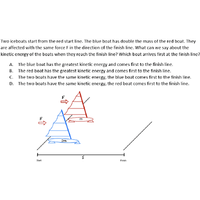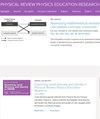Enhancing peer instruction in physics: Understanding cognitive processes and refining rules
IF 3.6
2区 教育学
Q1 EDUCATION & EDUCATIONAL RESEARCH
Physical Review Physics Education Research
Pub Date : 2024-05-03
DOI:10.1103/physrevphyseducres.20.010134
引用次数: 0
Abstract
Peer Instruction gives practice in the abstract language of physics, addresses common misconceptions among students, and is more effective than traditional lecturing. However, it is not clear what makes Peer Instruction effective nor how we might improve the method. An emerging perspective is that what makes Peer Instruction effective is how it stimulates certain cognitive processes. Research also indicates that providing rules for discussion may improve the effect of peer instruction. Hence, we wanted to answer two research questions in this study: (i) What cognitive learning processes occur during peer discussions? (ii) How do students follow discussion rules? To answer our research questions, we recorded and thematically analyzed peer discussions during Peer Instruction in an introductory physics course. The most prevalent cognitive process during peer discussions was decoding the problem. The most prevalent type of explanation was explanations with physics concepts, which usually led the students to an incorrect answer. The next most prevalent type of explanation was explanation with physics models, which usually led the students to the correct answer. The students also explained with reference to their experience or examples—intuitive or analogical explanations—and it usually added little to the conversation, was wrong, or created confusion. Some discussion rules had limited impact, prompting suggestions for rule improvements to optimize Peer Instruction. Our work contributes to the literature on Peer Instruction with a cognitively based description of the learning processes and how we might further improve and ensure the effectiveness of Peer Instruction.

加强物理同伴教学:了解认知过程并完善规则
同伴教学法可以让学生练习抽象的物理语言,解决学生中常见的误解,而且比传统的讲授法更有效。然而,同伴教学之所以有效,以及我们如何改进这种方法,目前尚不清楚。一种新的观点认为,同伴教学之所以有效,在于它如何激发某些认知过程。研究还表明,提供讨论规则可以提高同伴教学的效果。因此,我们希望在本研究中回答两个研究问题:(i) 在同伴讨论过程中会出现哪些认知学习过程?(ii) 学生如何遵守讨论规则?为了回答研究问题,我们记录并专题分析了物理入门课程同伴教学过程中的同伴讨论。同伴讨论中最普遍的认知过程是解码问题。最常见的解释类型是对物理概念的解释,这通常会导致学生得出错误的答案。其次是用物理模型进行解释,这通常会让学生得出正确答案。学生们还会参照自己的经验或例子进行解释--直觉式或类比式解释--但这通常对谈话没有什么帮助,或者是错误的,或者会造成混乱。一些讨论规则的影响有限,这促使我们提出改进规则的建议,以优化同伴教学。我们的工作为同伴教学文献做出了贡献,从认知角度描述了学习过程以及如何进一步改进和确保同伴教学的有效性。
本文章由计算机程序翻译,如有差异,请以英文原文为准。
求助全文
约1分钟内获得全文
求助全文
来源期刊

Physical Review Physics Education Research
Social Sciences-Education
CiteScore
5.70
自引率
41.90%
发文量
84
审稿时长
32 weeks
期刊介绍:
PRPER covers all educational levels, from elementary through graduate education. All topics in experimental and theoretical physics education research are accepted, including, but not limited to:
Educational policy
Instructional strategies, and materials development
Research methodology
Epistemology, attitudes, and beliefs
Learning environment
Scientific reasoning and problem solving
Diversity and inclusion
Learning theory
Student participation
Faculty and teacher professional development
 求助内容:
求助内容: 应助结果提醒方式:
应助结果提醒方式:


